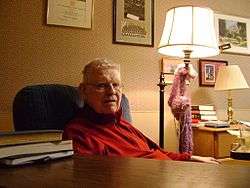Thomas Skidmore
Thomas Elliot Skidmore (22 July 1932, in Troy, Ohio – 11 June 2016) was an American historian and scholar who specialized in Brazilian history.[1]

Biography
Skidmore graduated in political science and philosophy in 1954 from Denison University. He received a Fulbright Fellowship to study philosophy at Magdalen College, Oxford where he met his wife Felicity. He received a second B.A. in Philosophy, Politics and Economics in 1956 and a master's degree in 1959. He obtained his Ph.D. at Harvard University in 1960 with a thesis on the German Chancellor Leo von Caprivi.[2]
His attention shifted to South America after the Cuban Revolution. His Harvard post-doctorate focused on Brazil. In 1967 he published Politics in Brazil: 1930-64, An Experiment in Democracy.[2]
In 1966, Skidmore joined the faculty of the University of Wisconsin, Madison. He became a full professor in 1968. In 1986, Skidmore moved to Brown University.[2]
Selected bibliography
- Politics in Brazil 1930–1964: An Experiment in Democracy (Oxford University Press, 1967)
- Black Into White: Race and Nationality in Brazilian Thought (Oxford University Press, 1974)
- Modern Latin America, with Peter H. Smith and James N. Green (Oxford University Press, multiple editions, 1984–2005)
- The Politics of Military Rule in Brazil: 1964–1985 (1988)
- Television, Politics, and the Transition to Democracy in Latin America (Johns Hopkins University Press, 1993, ed.)
- “Bi-Racial U.S.A. vs Multi-Racial Brazil: Is the Contrast Still Valid?,” Journal of Latin American Studies 25, no. 2 (1993): 373-385
- Brazil: Five Centuries of Change (Oxford University Press, 1999)
References
- Thomas Skidmore (1932-2016): A Tribute. Latin America Centre. University of Oxford.
- "Thomas E. Skidmore Collection". Retrieved 2009-07-08.